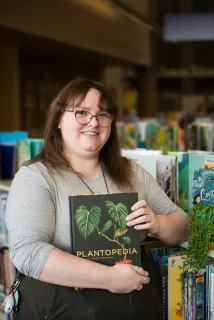Histories of the Women, by the Women, and for the Women
These non-fiction titles focus on the many ways feminine forces have influenced history. Expect most (but not all) of these titles to be written with attitude!
Emily and Elizabeth Blackwell faced great challenges during their pursuit of improved medical services for women. While their beliefs and efforts didn't always align with the feminist movement of their day, they knew there was a need for female doctors, and they felt that there were women capable of meeting that need. So, with an impressive amount of grit and determination, this pair helped forge the way for women to be included in medical schools and practices.
I've always been a fan of linguistics and wordplay, so this book, sating both my curiosity around language and my interest in history, was doubly delightful. In it, Jenni Nuttall not only examines how historical changes in both slang and official terminology have reflected the societal values and expectations of each era, but she also considers today's lexicon and reconnects us to some of the "women's words" we've lost along the way.
These three women each raised a son who went on to become one of the foremost advocates of the American Civil Rights movement – but what of the women who raised them? In her book, Anna Malaika Tubbs explores not only the relationships between these mothers and their famous sons, but also how their lives before (and during) motherhood shaped the families they raised.
What a crossover! This recipe-laden book explores the history of Italian-American cuisine, down to the first generation of southern Italians that sought their fortunes in the USA. Not only does Lucinda S. Quinn provide stories of the women immigrants who brought - and adapted! - their family's ancient recipes for American ingredients, but it also provides the recipes themselves, each one made with readily accessible ingredients and sorted for easy browsing.
For fear of the political support she would garner, the story of Ona Judge was kept from the public for decades after she escaped from the presidential mansion in 1796. She refused over and over again to be brought back into slavery, proud of her state-recognized freedom in New Hampshire, despite repeated attempts by the Washington family to “reclaim” her to Virginia. Slavery ruined the lives of far too many in early America, but Ona Judge proved that its long arm was not unstoppable. This is the story of just one woman, but it is an incredible one.
Rome’s history is often told through the achievements of its citizens. The chroniclers of the empire were men, and their focus rarely wandered from the accomplishments of other men. But what of the women who helped Rome become the vast, storied empire we recognize from history books today? Emma Southton sheds light on a variety of Roman women (from those who were seen as the epitome of Roman womanhood to those who were considered villainous, to those left entirely unnamed in the histories), and she does so with no small amount of wit and charm.
I don't have a particular interest in sheep, but I love animals and I’m always ready to hear about those species that survive near-extinction. Jane Cooper, who took up shepherding for love of wool textiles, found herself the guardian of a “lost flock": the last group of an ancient, primitive sheep breed. This book tells the story of how she rose to the challenge of not just saving the Orkney Boreray, but setting them up to become one Scotland’s most sustainable breeds.
This book depicts the cultural development of North American Indigenous tribes, from the early civilizations that congregated along the Mississippi to the various, distinct tribes that ranged the continent in early U.S. history, to the cultural touchstones and figures we recognize from media today. While it may not seem distinctly focused on "herstory," this book made the list because uniquely, it there is no small amount of focus on the role and power of women in Native American societies as they developed over the millennia.
Be warned: Kate Lister does not pull punches. (This book had an entire chapter on the origins, history, and modern-day usage of my favorite four-letter word.) But if you have a strong sense of humor and an interest in off-beat historical rabbit holes, this book is a treasure I can’t recommend enough. It’s both enlightening and entertaining, particularly if you listen to the audiobook. It's read by the author herself, and Lister’s broguish accent makes the entire readthrough, and especially my favorite chapter, all the more scintillating.
Talk about a nail-biter! Ever since I attended a British WWII museum and experienced a faux “blackout” as a child, I’ve been fascinated by the heroes and heroines of that historic era. Virginia Hall was an American herself, but she carried out secret missions in France long before the US even got involved in the Pacific arena of WWII – and while she herself might have been exceedingly close-lipped about her story, it’s now one that can (and should) be shared.
It’s a sad truth that the women of Greco-Roman mythology are often overlooked. While Hera is best known as a jealous, wrathful wife, how often do we hear the origins of her marriage to Zeus? What of Hestia, once the most central goddess of the religion? In this book, Natalie Hayes sheds much-needed light on some of my favorite mythological figures, and she does it with well-informed awareness and humor.
